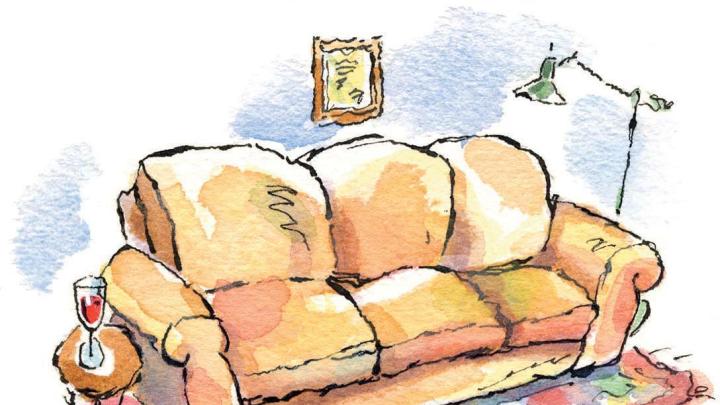A professor once advised me that I shouldn’t have possessions until I have tenure. “Then,” he said, “you can start to collect books.” I’ve given away so many of my books over the years. The Harvard Advocate’s library gets replenished every spring because students don’t want to pay to store their labored-over coursebooks. This year, to fill my five-tier Ikea bookshelf, I rented a Zipcar and drove about four dozen of my old, carefully annotated, paperbacks from the Advocate back to my new off-campus apartment.
Once you have your own space, populating it becomes an extracurricular. My mother and I drove my antique childhood desk up to Cambridge from my home in Pittsburgh in anticipation of the four empty rooms I would need to fill with things. Later, my friend and I rented a truck and drove to north Medford to pick up an $80 Craigslist couch, whose previous owner dropped racial slurs with impressive density; while I pulled the car around he asked my friend to scrub his bathtub. I still don’t think of the things I acquired from Craigslist adventures—coffee tables, dressers, lamps, armchairs—as mine for the long haul.

Up until this fall, everything I owned had to go into boxes once a year. My possessions were limited to things that could be compacted to fit into a 24-inch cube. This rhythm comes with a sense of anticipation: I could relocate to another city at the drop of a hat. At this stage of our lives, we should always be ready to move, I am told, and since I moved to boarding school at age 14 I’ve used mobility as the cornerstone of my identity as an independent young thing.
Letting go of this freedom has been an adventure in commitment; I am beginning to come around to the idea of having things. That antique desk still has a ghost-shaped eraser where a drawer pull should be: my first clear memory is of screwing that eraser on circa 1998. I bought myself the succulent on my desk after a break-up. Possessions function as receptacles for meaning and recipients of my impulse to take care of something. All the more to leave behind when I do go.
Before this move, I spent five years with the same ubiquitous dorm furniture. I had five different desks, five different dressers, five different bed frames and mattresses, all probably manufactured in the same factory. By the last iteration I had a system for what went in each of my four desk drawers. I knew just how to layer my various mattress pads for optimum comfort on an XL twin. Other people are sleeping on each of those mattresses now and keeping their underwear in my old underwear drawers. Dorm rooms were wiped clean of history at the end of each year, though the barely visible stains of previous lives refused to entirely come out of their carpets. We were always trying to transcend this transience, this material ubiquity: at boarding school we would Sharpie notes to future denizens into the drawers of our desks: words of encouragement for when the work got too hard and the weather too cold, or anecdotes of past shenanigans to which the room had borne witness.
Sophomore year, I lived in a shiny one-room double in newly renovated Dunster House: two desks, two dressers, two beds. Ten square feet of open floor space. It was pristine, but it was also sterile. I felt like I was living in a hotel or a hospital. You get used to being stared at by the tour groups in the Yard, but when you live in a space that exists as a model for donors you start to feel like a part of the furniture. You have a bed for sleeping and a dining hall for eating and a shower for getting clean. The space in which you dwell was built to satisfy, and to do so with minimal effort on your part. It’s not spartan: Dunster has televisions and squash courts and pool tables and a grille—all the things we are supposed to require in order to relax. But the squash courts have big windows and the pool tables are right in the entrance. “Look,” Harvard says, “we are giving our students wholesome lives.”
Somehow using these supposedly “fun” additions feels like yet another stage for performance. Now we are demonstrating how relaxed we can be while still achieving at such a high level. Suddenly the criteria of satisfaction feel like a set of checkboxes on some administrator’s list of things a consulting group has decided we need. This brain-in-a-jar lifestyle aligns with Harvard’s ethos of packed schedules and intellectual maturation. It makes room for the good stuff by eliminating the time-suck involved in taking care of a space. But after five years of boarding school and college dorm life, I felt like a catatonia patient on an IV drip of food and gym machines and single-ply toilet paper.
This year, as a junior, I live in a three-story cube behind Peabody Terrace. It isn’t New Dunster: recently a mouse crawled into a box of my winter clothing and died there. The walls are cracked in places and bored with the holes screws left behind. But we have a living room, a kitchen, and a library, each with austere large-paned windows that cast quadrangles of cold sunlight over the grey walls. I sit on my bed as I wake up and feel like the pensive woman in pink in Hopper’s Morning Sun. Out my bedroom window is the neighborhood: yards and parking lots and garages spill into one another. I don’t have a view of the river, but I can see the Peabody Terrace playground with its newfangled jungle gym, and to its left, the Blackstone Steam Plant’s brick industrial mass.There’s a community garden next door where the sunflowers grew above my head.
A 2015 Crimson op-ed claims that only 2 percent of students, or about 120 people, move off campus. It’s a motley crew—students who have taken extensive time off, married undergrads, the rare fraternity brothers who choose to live in their frat house, people with special medical requirements. Harvard’s admissions website refers to undergraduates who have been “granted permission” to live off campus as if it’s a big privilege, but I just checked a box on an online form.

It was surprisingly easy to extricate myself from typical undergrad life. Most students don’t even consider doing so, and those who do are generally put off by perceived obstacles that I don’t think are grounded in reality. The general conception is that apartments are only for the really rich kids (though my living expenses for a full 12 months of the year will be exactly $1,400 more than what Harvard charges for seven months). I get it: it’s scary to go off on your own. I was scared. Easier not to.
I’m still learning how to live like a grown-up. I’ve dragged my friend group along for the ride. In the first weeks when friends came over they would tentatively apologize for failing to bring a bottle of wine or a salad or something, looking at me as if I were some kind of authority on grown-up social etiquette. In reality all of us—me included—felt discomfitingly unsure of whether that was actually an expectation. We were all comfortable bringing half a box of Franzia to a friend’s dorm room, but something about an Apartment spawned a different sense of obligation. Mastery of these novel rituals feels more like the real threshold of adulthood than competency in cooking or cleaning. Suddenly everyone around me is clumsily trying to navigate adult social behaviors, the codes of guesthood and ways of occupying each other’s spaces that we’ve watched our parents seemingly execute with effortless style.
But I don’t want people to feel they are leaving their comfort zones to spend time in my world. I want my world to extend that comfort zone beyond the buildings accessible only with an activated College ID card. I want my apartment to be the kind of neutral social space that Harvard knows it can’t provide. The spaces that aren’t heavily administered by the University itself belong to all manner of smaller institutions, each with its own reputation and code of social behavior. Don’t get me wrong: I have deep affection for the buildings of my own organizations. They’re a rare privilege unavailable to undergraduates at any other college. They provided a comfortable communal space during my two years in College housing. But I hope I can give my friends a spot that stands outside of Harvard’s dense network of formal affiliation and social regulation.
On our free evenings during the dining-hall workers’ strike in October, my friends came over for dinner; we made our signature grilled cheese with Colby jack and spicy tomatoes and onions. They came off the skillet one by one, so we ate in turns. Later we retired to the fire escape with a couple of beers and my Bluetooth speakers. There are only two chairs out there (the blue lawn chair we inherited from the previous tenants and the white-washed wood one borrowed from the Advocate building), so whoever was left sat on a towel on the cinder block. We watched the steam from the Blackstone smokestacks join the clouds for hours. Friends floated in and out throughout each evening, and we joked about rigging up a sensor to my door that would play a bass riff every time someone entered the apartment, like on Seinfeld. “I feel like this is the set for the sitcom of our lives,” my friend said. This is what I want: to provide the mise en scène, but not be its only protagonist.

Our speech habits say it all. “I’m going back to my room,” I would say for those years I lived on campus. Or, “I’m going back to Dunster.” I don’t say this anymore. In the daytime I spend long hours reading in the Advocate building. I camp out with my work on the patio of the Carpenter Center and go to class on the third floor of Barker. I hang around the Lampoon in the evening, and then at the end of the night I go home.









